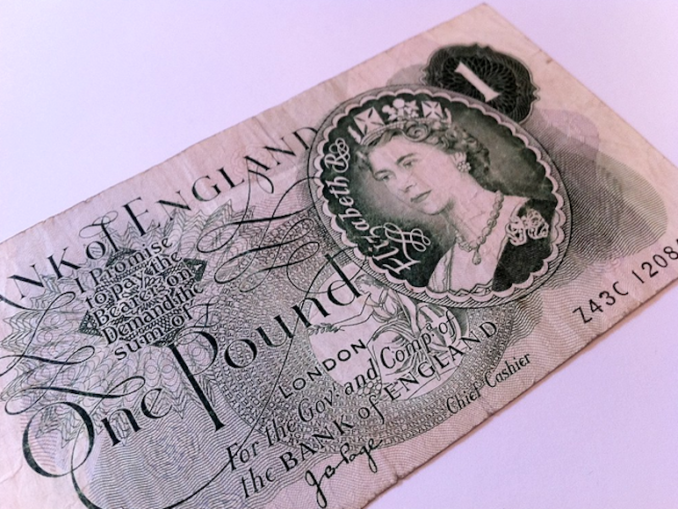
One Pound note,
Howard Lake – Licence CC BY-SA 2.0
I often hear pensioners on the radio espousing their lot and think there but for some good advice from my dear departed dad could go I. I cannot imagine living on only a state pension, in my case £742.98p every 4 weeks. Fortunately, I don’t have a mortgage or rent to pay, as I am living in my own house, but this is through financial planning throughout my working life.
As many of you may remember, from previous articles, I left school in 1966 at 16 with ‘O’ levels and joined Babcock and Wilcox as a London office apprentice. My wages were a pittance, £5 9s 3d, but I was at least earning. I didn’t earn enough to pay income tax and as I was working away from the home office I had to use the 3d (paid in the form of a stamp) to send a receipt back to the head office. The nine shillings went in National Insurance so I had £5 a week in my pocket. I had to travel daily from Finchley to Borough on the Tube so of course some of that went on fares. My Dad bought me a season ticket and I paid him back weekly. I paid my mum £1 a week, not a lot I know, but it was the principle. You earn, you pay.
That first year was hard going financially. I was too young to go to the pub and entertainment revolved around youth clubs, playing football (or cricket in the summer) in the park and occasionally the pictures. But I managed to save and the next summer, with my pals Graham and Phil, had a fortnight in a cheap holiday flatlet in Paignton and a cracking holiday was enjoyed.
One of the first things my dad asked me when I told him I was going to take up the job offer from Babcock was, “Do they have a pension scheme?” I went through the paperwork and found they had a final salary pension scheme (FSP) that for each year in it paid 1/60 of your final salary up to the legal maximum of 40/60th. Dad reckoned that was pretty good, but I couldn’t join until I was 21. Each year I would be expected to pay in 5% of my annual salary and Babcock would match that. Dad explained that 5% of your salary at 21 buying 1/60th of your final salary was good value for money. In later years, in pure money terms, each 1/60th cost you more and more to buy as your wages increased.
Being 16, and not being paid much, I didn’t want to think about retirement, it was too far away. But when I got to 21 the company wrote to me asking if I wanted to join the scheme. By then I was just about to finish my apprenticeship and was earning more so I had a think of what dad had said. In the last few months of my apprenticeship I was earning over £20 a week and within a couple of months it would go up higher when I took up a full-time position. I did a quick calculation in my head, for £1 a week I would get 1/60th of say £20,000 a year when I retired which was £333. Of course, I was guessing what I would be earning when I retired but that seemed like a good investment so I signed up.
Of the 20 apprentices in my intake, I think that only four or five signed up. Most of the others said they would rather have the money in their monthly pay packet then and there. I well remember a couple asking what the point was of saving for a company pension when you would get one from the state. My answer was I wanted to have enough money to live comfortably when I retired, not to have to scrimp by on a tiny state pension.
About halfway through my employment with Babcock, they, like many other companies, closed the final salary pension scheme to new entrants and replaced it with Money Purchase Scheme (MPS). In this scheme, you pay in a percentage of your salary, as in a final salary scheme but it is not very often fully matched by company contributions. The pot of money built up is supposed to be used to purchase an annuity when you retire. But inevitably it doesn’t pay as much as an FSP as it is subject to interest rate rather than a guaranteed percentage of your final salary. The company gave people the option of switching to the MPS but I reckoned you would have to be a mug to do so. I stuck with the FSP.
At the age of 56, the company decided to make me redundant. Now came the next question what to do with my pension. As I was within 10 years of my official retirement I could opt to retire and take my pension, although I would have to wait until I was 65 to get my old age pension. I had accumulated 35 years in the fund or 35/60th of my current salary. I was on good money then, earning much more than when I did my original calculations. However, the problem with drawing my pension then meant that it would have to pay out for a number of additional years. So I had to lose a percentage for each year I retired early and this reduced the pension too much to consider that option. Instead, it could be frozen at 35/60th of my final salary but it was increased every year by 2.5% or inflation plus 1% whichever was higher. So that was what I opted for, and started to look for another job to see me through to retirement.
The job I found had an MPS pension, but with a six month qualification period. After six months I signed up and started paying into the scheme. I knew it wasn’t going to pay me a huge amount but the beauty of pension schemes is that they are tax free and this made it a good way of saving. As many of you probably know after 5 1/2 years my managing director had a dispute with her father, the company chairman and majority owner. She set up her own business and offered me a job in the new organisation. However, we could both see the old company was falling to pieces and she suggested I hang on and get made redundant along with two others, who both also moved over to her new company.
So when I got to sixty-five I had 3 pensions to deal with, a state pension, an FSP and an MPS. Over the years I had also managed to make a number of investments in shares, investment trusts, ISAs and cash with the intention of using these to supplement my pension if necessary. The DHSS wrote to me telling me what I would get for my state pension, not a lot more than the basic minimum as for many years I had been opted out of the state supplementary schemes, like graduated pensions, as I had company pensions. I also got a letter from the Babcock pension scheme and due to years of inflation it was far more than I expected. In fact if I added it to the state pension I was better off retired than working! This of course is partly due to the fact that over 65’s don’t pay National Insurance.
So what to do with the third pension, purchase an annuity and take a small monthly income? The government had changed the rules on these small pension pots and I found I could take it as a lump sum. It wasn’t huge but it did allow me to buy a new car for my retirement.
So thanks to my dad pointing out that an FSP was the way to go all those years ago I am now what I suppose is financially comfortable. I own my own home, I have a decent income, I have savings and investments, I can afford to drive a decent car, go on cruises and not really think twice if I decide I want to purchase something. If only those pensioners had listened to my dad! It’s only a pity there are now so few FSP schemes about, companies have recognised how they can’t afford them and it’s only government departments, local councils and state enterprises that seem to offer them. They can afford it, it’s only our money they are spending.



